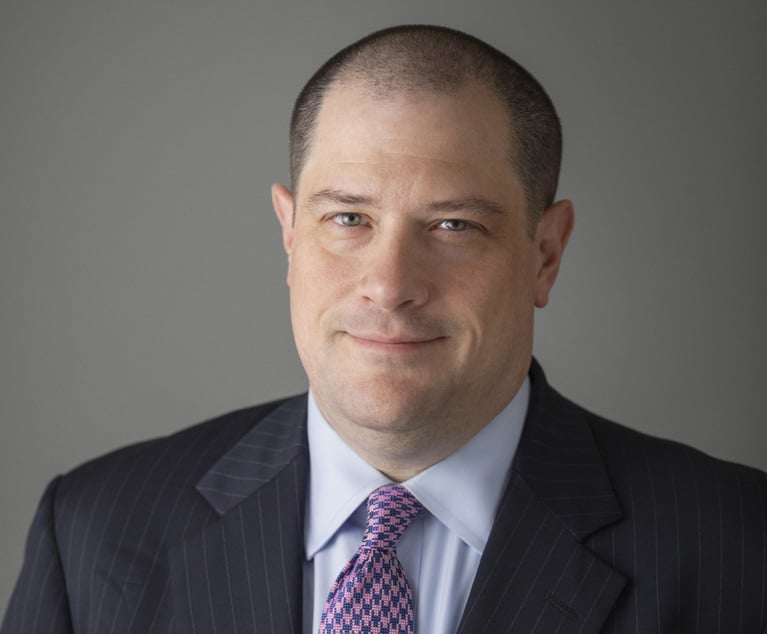 (Courtesy photo)
(Courtesy photo)As Influencer Marketing Evolves, Regulatory Agencies Are Taking Notice
FDA and FTC announce plans to further examine influencer advertising.
February 20, 2020 at 11:31 AM
5 minute read
The past few years alone have seen influencer marketing expand from traditional celebrity product reviews and oral endorsements to more nuanced imagery by less-known influencers ranging from self-made Instagram personalities to "virtual," computer-generated personas (who are nearly indistinguishable from humans when scrolling through social media). The category of products promoted by influencers is also expanding, transitioning from general consumer products to a greater number of partnerships in the health and wellness space.
The ubiquitous and evolving nature of influencer advertising has not been lost on regulatory agencies, with both the Food and Drug Administration and Federal Trade Commission announcing efforts to update the agencies' perspective on the impact of influencers on consumers.
Agencies Focus on Influencer Advertising
Last month, the FDA showed its focus on influencers by announcing that its Office of Prescription Drug Program will be conducting two studies on "Endorser Status and Explicitness of Payment in Direct-to-Consumer Promotion." An FDA spokesman said the agency will start data collection after they receive OMB approval, which the agency does not expect to receive before fall of 2020. According to FDA's announcement, the studies will evaluate four types of endorsers (celebrity, physician, patient and influencer) and whether a disclosure of the endorser's payment status disclosure influences the study subjects' reactions. The studies will also evaluate two types of disclosure language: "direct" (e.g., "paid ad") and "indirect" (e.g., sponsored ads). FDA is soliciting public comments on the studies, including ways to enhance the quality and clarity of the information to be collected. Comments will be accepted until March 30.
The scope of FDA's proposal was notable to those in the marketing space because of its overlap with concepts primarily regulated by the FTC—specifically, how consumers understand qualifying information and the existence of a material connection between a company and an influencer. Currently, the FTC's policy on qualifiers and endorsements is codified in the dot-com disclosures and Endorsement Guides, which have been criticized by some as being overly restrictive and not accounting for increased consumer familiarity with social media. For example, while the FTC has issued supplements to the Endorsement Guides, it has not formally amended the Endorsement Guides since 2009, when Facebook had just surpassed MySpace in popularity and Instagram did not exist.
In the past, the FDA has stated that it applies a similar "reasonable consumer standard" as the FTC when reviewing promotional material. Initially, FDA's proposed research was striking because it suggested the agency could be taking steps to modernize its understanding of the "reasonable consumer" in a manner that diverged from the regulatory standards for disclosures set in place by the FTC. On the heels of FDA's announcement, however, the FTC announced its intent to request public comment on the FTC's Endorsement Guides, showing that both agencies are looking to modernize their policies. The formal request will be published in the Federal Register on Feb. 21, making comments due April 21, 2020.
Many industry participants, like marketers, welcome the request for comment on the Endorsement Guides. They feel that the ability to comply with the current guides decreases, as social media character limits become more prevalent. These industry participants now have the chance to inform the FTC about consumer capacity to identify sponsored content and the effectiveness of providing qualifying information via hyperlink, QR codes or other mediums.
The FTC has opened the door to receiving such information explicitly asking for comments on:
- Whether disclosures of material connections are necessary;
- Whether consumers understand that persons promoting products on social media are likely being compensated;
- Whether current disclosures of material connections are adequate, especially in relation to children's products;
- Whether review websites should be required to disclose how reviews are solicited and generated; and
- Whether the Endorsement Guides should address how endorsers are using affiliate links—links through which consumers can purchase endorsed products.
What Companies Should Expect
As the agencies home in on influences, companies engaged in influencer marketing should not stand idle. After considering whether to submit comments to the agencies, companies can capitalize on the insights gained from the agencies' announcements in two key ways.
First, it should be expected that the agencies will share learnings from their respective information collection activities. The agencies work under a longstanding memorandum of understanding. Thus, in addition to monitoring the agencies' discussion of material connections, it is prudent to monitor FDA's learnings related to consumer understanding of risk information as they may impact the FTC's perspective on effective presentation of disclaimers, including the effectiveness of hyperlinks and other mediums.
Companies should also anticipate a potential shift in the agencies' enforcement priorities and, in particular, heightened scrutiny of influencer marketing of health products or targeted at "vulnerable populations" (e.g., youth or seniors). Notably, the FTC's request for comment specifically mentions the promotion of children's products. And regulatory enforcement related to influencers is a growing trend, globally, including in the U.K. and Germany.
As FDA and the FTC keep their eyes on influencers, we will keep our eyes on the agencies.
Raqiyyah Pippins is a partner at Arnold & Porter, where she focuses her practice on FDA and FTC regulation of food, dietary supplement, cosmetic, drug and medical-device products sold to consumers.
This content has been archived. It is available through our partners, LexisNexis® and Bloomberg Law.
To view this content, please continue to their sites.
Not a Lexis Subscriber?
Subscribe Now
Not a Bloomberg Law Subscriber?
Subscribe Now
NOT FOR REPRINT
© 2024 ALM Global, LLC, All Rights Reserved. Request academic re-use from www.copyright.com. All other uses, submit a request to [email protected]. For more information visit Asset & Logo Licensing.
You Might Like
View All
Protecting Attorney-Client Privilege in the Modern Age of Communications
6 minute read

Lingering Questions at Supreme Court About Climate Change Litigation Need Resolution
6 minute read
Trending Stories
- 1Jury Finds Dentons, Ex-Partner Beats Malpractice Claim Over $54 Million Currency Deal
- 2Former Cahill Executive Committee Member, Leveraged Finance Pioneer Dies at 67
- 3State Attorney General Faces Federal Courtroom Test Over Crypto Mining Ban
- 4The Corporate Transparency Act: One Year Later With Deadline Looming
- 5Getting Cameras in Federal Courts Will Take More than Logic
Who Got The Work
Michael G. Bongiorno, Andrew Scott Dulberg and Elizabeth E. Driscoll from Wilmer Cutler Pickering Hale and Dorr have stepped in to represent Symbotic Inc., an A.I.-enabled technology platform that focuses on increasing supply chain efficiency, and other defendants in a pending shareholder derivative lawsuit. The case, filed Oct. 2 in Massachusetts District Court by the Brown Law Firm on behalf of Stephen Austen, accuses certain officers and directors of misleading investors in regard to Symbotic's potential for margin growth by failing to disclose that the company was not equipped to timely deploy its systems or manage expenses through project delays. The case, assigned to U.S. District Judge Nathaniel M. Gorton, is 1:24-cv-12522, Austen v. Cohen et al.
Who Got The Work
Edmund Polubinski and Marie Killmond of Davis Polk & Wardwell have entered appearances for data platform software development company MongoDB and other defendants in a pending shareholder derivative lawsuit. The action, filed Oct. 7 in New York Southern District Court by the Brown Law Firm, accuses the company's directors and/or officers of falsely expressing confidence in the company’s restructuring of its sales incentive plan and downplaying the severity of decreases in its upfront commitments. The case is 1:24-cv-07594, Roy v. Ittycheria et al.
Who Got The Work
Amy O. Bruchs and Kurt F. Ellison of Michael Best & Friedrich have entered appearances for Epic Systems Corp. in a pending employment discrimination lawsuit. The suit was filed Sept. 7 in Wisconsin Western District Court by Levine Eisberner LLC and Siri & Glimstad on behalf of a project manager who claims that he was wrongfully terminated after applying for a religious exemption to the defendant's COVID-19 vaccine mandate. The case, assigned to U.S. Magistrate Judge Anita Marie Boor, is 3:24-cv-00630, Secker, Nathan v. Epic Systems Corporation.
Who Got The Work
David X. Sullivan, Thomas J. Finn and Gregory A. Hall from McCarter & English have entered appearances for Sunrun Installation Services in a pending civil rights lawsuit. The complaint was filed Sept. 4 in Connecticut District Court by attorney Robert M. Berke on behalf of former employee George Edward Steins, who was arrested and charged with employing an unregistered home improvement salesperson. The complaint alleges that had Sunrun informed the Connecticut Department of Consumer Protection that the plaintiff's employment had ended in 2017 and that he no longer held Sunrun's home improvement contractor license, he would not have been hit with charges, which were dismissed in May 2024. The case, assigned to U.S. District Judge Jeffrey A. Meyer, is 3:24-cv-01423, Steins v. Sunrun, Inc. et al.
Who Got The Work
Greenberg Traurig shareholder Joshua L. Raskin has entered an appearance for boohoo.com UK Ltd. in a pending patent infringement lawsuit. The suit, filed Sept. 3 in Texas Eastern District Court by Rozier Hardt McDonough on behalf of Alto Dynamics, asserts five patents related to an online shopping platform. The case, assigned to U.S. District Judge Rodney Gilstrap, is 2:24-cv-00719, Alto Dynamics, LLC v. boohoo.com UK Limited.
Featured Firms
Law Offices of Gary Martin Hays & Associates, P.C.
(470) 294-1674
Law Offices of Mark E. Salomone
(857) 444-6468
Smith & Hassler
(713) 739-1250









